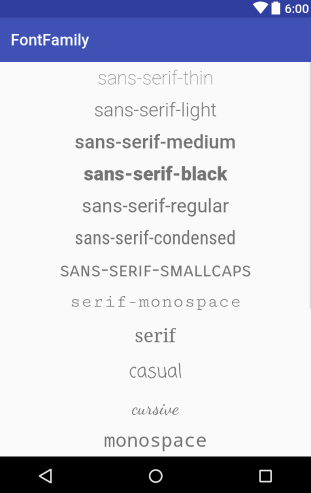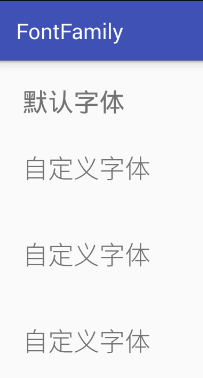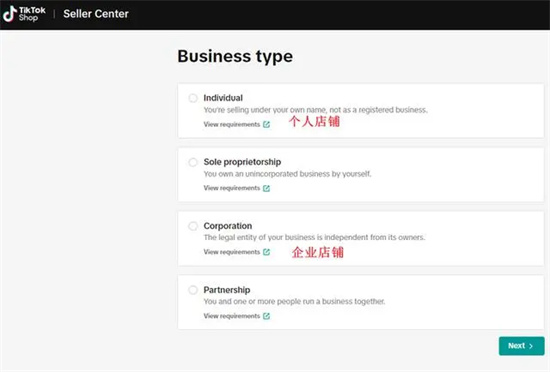Android修改字体样式的示例代码
在Android实际开发中根据UI的设计图,经常要去改变系统默认的字体样式
这样做会使apk变大很多啊
而且为什么android要使用ios的字体-_-#
单独设置字体样式
(1)Android系统提供了几种字体样式可供选择
通过设置typeface属性或者fontFamily属性设置
typeface属性:
- normal
- serif
- sans
- monospace
fontFamily属性:
- casual
- cursive
- serif
- monospace
- sans-serif
- sans-serif-condensed
- serif-monospace
- sans-serif-smallcaps
※typeface和fontFamily区别
android:typeface属性是增加API1
android:fontFamily在API16(4.1)中添加了属性
※当同时设置typeface和fontFamily时,只有fontFamily生效
查看一波TextView的源码
private void setTypefaceFromAttrs(String familyName, int typefaceIndex, int styleIndex) {
Typeface tf = null;
if (familyName != null) {
tf = Typeface.create(familyName, styleIndex);
if (tf != null) {
setTypeface(tf);
return;
}
}
switch (typefaceIndex) {
case SANS:
tf = Typeface.SANS_SERIF;
break;
case SERIF:
tf = Typeface.SERIF;
break;
case MONOSPACE:
tf = Typeface.MONOSPACE;
break;
}
setTypeface(tf, styleIndex);
}
从方法setTypefaceFromAttrs()看,如果你有set fontFamily属性,那么typefaceattribute将被忽略。
这边会发现这样设置typeface和fontFamily属性对中文不生效,这时候就需要引用外部的字体样式(这里谷歌设计规范推荐使用NOTO字体)
(2)使用字体样式文件设置(otf,ttf文件都可以)
在assets下新建一个fonts文件,把字体样式文件放进去
在代码中设置
AssetManager mgr = getAssets(); Typeface tf = Typeface.createFromAsset(mgr, "fonts/NotoSansCJKsc-Black.otf"); tv_1.setTypeface(tf);
批量设置字体样式
(1)自定义TextView
public class CustomTextView extends TextView
{
public CustomTextView(Context context, AttributeSet attrs)
{
super(context, attrs);
}
//重写设置字体方法
@Override
public void setTypeface(Typeface tf)
{
tf = Typeface.createFromAsset(getContext().getAssets(), "fonts/NotoSansCJKsc-Light.otf");
super.setTypeface(tf);
}
}
之后在XML布局文件中使用CustomTextView代替TextView
(2)更换整个App的字体
思路:遍历找到所有的TextView然后替换字体
百度了一下找到下面工具类
package com.test.fontfamily;
import android.app.Application;
import android.content.Context;
import android.graphics.Typeface;
import android.support.annotation.NonNull;
import android.view.View;
import android.view.ViewGroup;
import android.widget.TextView;
import java.lang.ref.SoftReference;
import java.lang.reflect.Field;
import java.util.HashMap;
import java.util.Map;
/**
* Created by Administrator on 2017/10/24.
*/
public class FontUtils
{
private static final String TAG = FontUtils.class.getSimpleName();
private Map> mCache = new HashMap();
private static FontUtils sSingleton = null;
public static Typeface DEFAULT = Typeface.DEFAULT;
// disable instantiate
private FontUtils()
{
}
public static FontUtils getInstance()
{
// double check
if (sSingleton == null)
{
synchronized (FontUtils.class)
{
if (sSingleton == null)
{
sSingleton = new FontUtils();
}
}
}
return sSingleton;
}
/**
* Replace the font of specified view and it's children
*
* @param root The root view.
* @param fontPath font file path relative to 'assets' directory.
*/
public void replaceFontFromAsset(@NonNull View root, @NonNull String fontPath)
{
replaceFont(root, createTypefaceFromAsset(root.getContext(), fontPath));
}
/**
* Replace the font of specified view and it's children
*
* @param root The root view.
* @param fontPath font file path relative to 'assets' directory.
* @param style One of {@link Typeface#NORMAL}, {@link Typeface#BOLD}, {@link Typeface#ITALIC}, {@link Typeface#BOLD_ITALIC}
*/
public void replaceFontFromAsset(@NonNull View root, @NonNull String fontPath, int style)
{
replaceFont(root, createTypefaceFromAsset(root.getContext(), fontPath), style);
}
/**
* Replace the font of specified view and it's children
*
* @param root The root view.
* @param fontPath The full path to the font data.
*/
public void replaceFontFromFile(@NonNull View root, @NonNull String fontPath)
{
replaceFont(root, createTypefaceFromFile(fontPath));
}
/**
* Replace the font of specified view and it's children
*
* @param root The root view.
* @param fontPath The full path to the font data.
* @param style One of {@link Typeface#NORMAL}, {@link Typeface#BOLD}, {@link Typeface#ITALIC}, {@link Typeface#BOLD_ITALIC}
*/
public void replaceFontFromFile(@NonNull View root, @NonNull String fontPath, int style)
{
replaceFont(root, createTypefaceFromFile(fontPath), style);
}
/**
* Replace the font of specified view and it's children with specified typeface
*/
private void replaceFont(@NonNull View root, @NonNull Typeface typeface)
{
if (root == null || typeface == null)
{
return;
}
if (root instanceof TextView)
{ // If view is TextView or it's subclass, replace it's font
TextView textView = (TextView) root;
// Extract previous style of TextView
int style = Typeface.NORMAL;
if (textView.getTypeface() != null)
{
style = textView.getTypeface().getStyle();
}
textView.setTypeface(typeface, style);
} else if (root instanceof ViewGroup)
{ // If view is ViewGroup, apply this method on it's child views
ViewGroup viewGroup = (ViewGroup) root;
for (int i = 0; i Replace the font of specified view and it's children with specified typeface and text style
*
* @param style One of {@link Typeface#NORMAL}, {@link Typeface#BOLD}, {@link Typeface#ITALIC}, {@link Typeface#BOLD_ITALIC}
*/
private void replaceFont(@NonNull View root, @NonNull Typeface typeface, int style)
{
if (root == null || typeface == null)
{
return;
}
if (style 3)
{
style = Typeface.NORMAL;
}
if (root instanceof TextView)
{ // If view is TextView or it's subclass, replace it's font
TextView textView = (TextView) root;
textView.setTypeface(typeface, style);
} else if (root instanceof ViewGroup)
{ // If view is ViewGroup, apply this method on it's child views
ViewGroup viewGroup = (ViewGroup) root;
for (int i = 0; i Create a Typeface instance with specified font file
*
* @param fontPath font file path relative to 'assets' directory.
* @return Return created typeface instance.
*/
private Typeface createTypefaceFromAsset(Context context, String fontPath)
{
SoftReference typefaceRef = mCache.get(fontPath);
Typeface typeface = null;
if (typefaceRef == null || (typeface = typefaceRef.get()) == null)
{
typeface = Typeface.createFromAsset(context.getAssets(), fontPath);
typefaceRef = new SoftReference(typeface);
mCache.put(fontPath, typefaceRef);
}
return typeface;
}
private Typeface createTypefaceFromFile(String fontPath)
{
SoftReference typefaceRef = mCache.get(fontPath);
Typeface typeface = null;
if (typefaceRef == null || (typeface = typefaceRef.get()) == null)
{
typeface = Typeface.createFromFile(fontPath);
typefaceRef = new SoftReference(typeface);
mCache.put(fontPath, typefaceRef);
}
return typeface;
}
/**
* Replace system default font. Note:you should also add code below to your app theme in styles.xml.
* {@code - monospace
}
* The best place to call this method is {@link Application#onCreate()}, it will affect
* whole app font.If you call this method after view is visible, you need to invalid the view to make it effective.
*
* @param context {@link Context Context}
* @param fontPath font file path relative to 'assets' directory.
*/
public void replaceSystemDefaultFontFromAsset(@NonNull Context context, @NonNull String fontPath)
{
replaceSystemDefaultFont(createTypefaceFromAsset(context, fontPath));
}
/**
* Replace system default font. Note:you should also add code below to your app theme in styles.xml.
* {@code - monospace
}
* The best place to call this method is {@link Application#onCreate()}, it will affect
* whole app font.If you call this method after view is visible, you need to invalid the view to make it effective.
*
* @param context {@link Context Context}
* @param fontPath The full path to the font data.
*/
public void replaceSystemDefaultFontFromFile(@NonNull Context context, @NonNull String fontPath)
{
replaceSystemDefaultFont(createTypefaceFromFile(fontPath));
}
/**
* Replace system default font. Note:you should also add code below to your app theme in styles.xml.
* {@code - monospace
}
* The best place to call this method is {@link Application#onCreate()}, it will affect
* whole app font.If you call this method after view is visible, you need to invalid the view to make it effective.
*/
private void replaceSystemDefaultFont(@NonNull Typeface typeface)
{
modifyObjectField(null, "MONOSPACE", typeface);
}
private void modifyObjectField(Object obj, String fieldName, Object value)
{
try
{
Field defaultField = Typeface.class.getDeclaredField(fieldName);
defaultField.setAccessible(true);
defaultField.set(obj, value);
} catch (NoSuchFieldException e)
{
e.printStackTrace();
} catch (IllegalAccessException e)
{
e.printStackTrace();
}
}
}
阅读源码发现这里面主要方法有
replaceFont()
替换一个页面中的所有字体。用递归的方式去查找view是否是TextView或者TextView的子类,然后进行替换。不过这种方法效率不高
用法:在页面中
FontUtils.getInstance().replaceFontFromAsset(View root, String fontPath)
modifyObjectField()
替换App所有字体。利用反射替换系统默认字体
用法:
a.新建一个BaseApplication继承Application在onCreate方法中
FontUtils.getInstance().replaceSystemDefaultFontFromAsset(this,"fonts/NotoSansCJKsc-Thin.otf");
b.在AppTheme中添加
- monospace


















